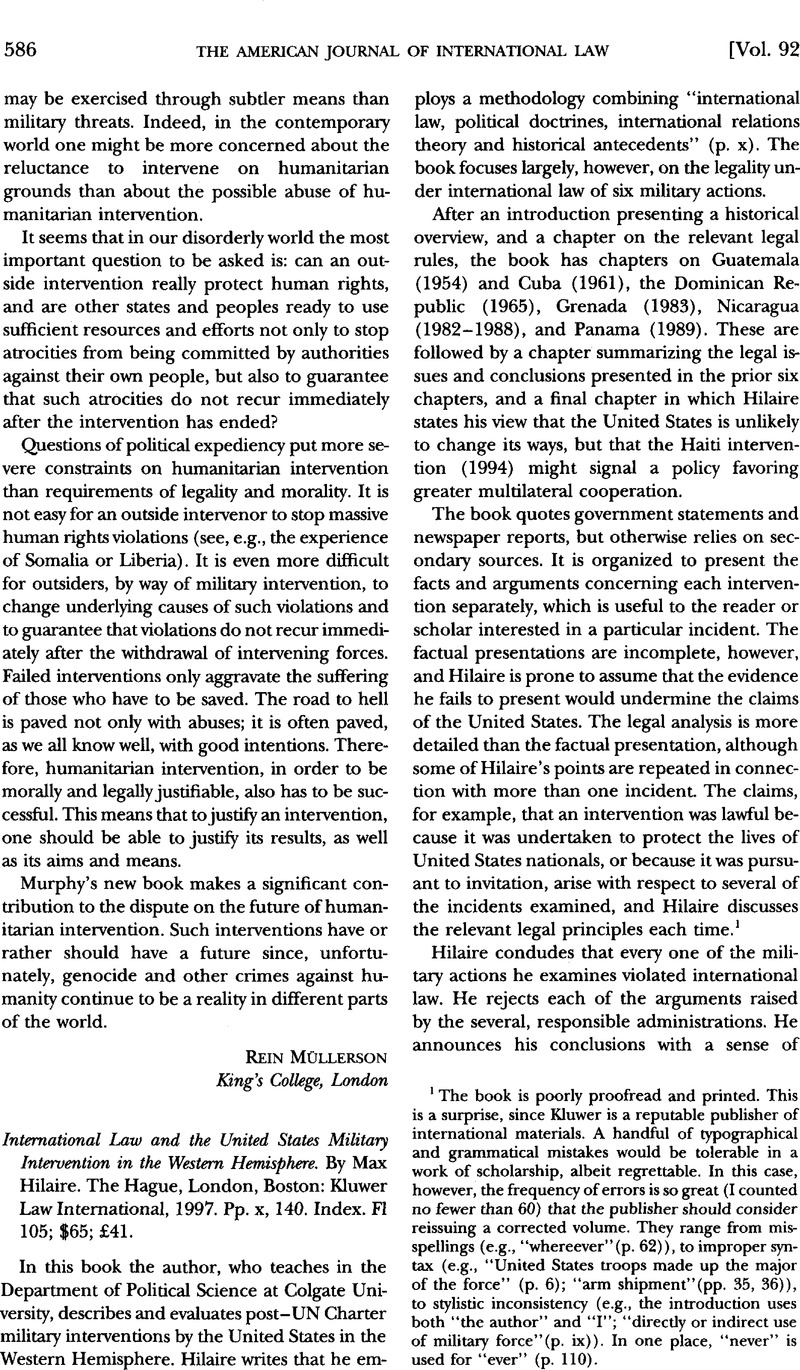No CrossRef data available.
Article contents
International Law and the United States Military Intervention in the Western Hemisphere. By Max Hilaire. The Hague, London, Boston: Kluwer Law International, 1997. Pp. x, 140. Index. Fl 105; $65; £41.
Published online by Cambridge University Press: 27 February 2017
Abstract

- Type
- Book Reviews and Notes
- Information
- Copyright
- Copyright © American Society of International Law 1998
References
1 The book is poorly proofread and printed. This is a surprise, since Kluwer is a reputable publisher of international materials. A handful of typographical and grammatical mistakes would be tolerable in a work of scholarship, albeit regrettable. In this case, however, the frequency of errors is so great (I counted no fewer than 60) that the publisher should consider reissuing a corrected volume. They range from misspellings (e.g., “wherever” (p. 62)), to improper syntax (e.g., “United States troops made up the major of the force” (p. 6); “arm shipment” (pp. 35, 36)), to stylistic inconsistency (e.g., the introduction uses both “the author” and “I”; “directly or indirect use of military force"(p. ix)). In one place, “never” is used for “ever” (p. 110).
2 Military and Paramilitary Activities in and against Nicaragua (Nicar. v. U.S.), 1986 ICJ Rep. 14 (June 27).
3 See, e.g., Ambassador Kirkpatrick’s Statement, UN Security Council, DEP’T ST: BULL., No. 2081, Dec. 1983, at 74.
4 See generally Abraham, D. Sofaer, International Law and the Use of Force , 13 Nat’l Interest 53, 55–57 (1988)Google Scholar. Presidents Johnson, Ford, Reagan and Clinton all used force in response to attacks on U.S. nationals or ships outside the United States, and President Kennedy imposed a quarantine and was prepared to go further owing to the threat posed by Soviet missiles in Cuba. On the latter point, see Abram, Chayes, Law and the Quarantine of Cuba , 41 Foreign Aft. 550 (1963)Google Scholar; Statement of Ambassador, Stevenson, in Max Hilaire, International Law and the United States Military Intervention in the Western Hemisphere 52 (1997)Google Scholar.
5 Abram, Chayes, A Common Lawyer Looks at International Law , 78 Harv. L. Rev. 1396 (1965)Google Scholar; Davis, R. Robinson, Letter from The Legal Adviser , 18 Int’l Law. 381 (1984)Google Scholar; Abraham, D. Sofaer, The Legality of the United States Action in Panama , 29 Colum. J. Transnat’l L. 281, 283 n.10 (1991)Google Scholar.
6 Sofaer, supra note 5, at 283–84.
7 See generally Jeane, J. Kirkpatrick & Allan, Gerson, The Reagan Doctrine, Human Rights, and International Law , in Right v. Might: International Law and the Use of Force 19 (2d ed. 1991)Google Scholar.
8 Hilaire notes the views of Derek Bowett, Thomas Franck, John Norton Moore, and W. Michael Reisman (p. 139), and he could have added others.
9 The most recent of many criticisms of the ICJ decision is Judge Schwebel’s, The Roles of the Security Council and the International Court of Justice in the Application of International Humanitarian Law, 27 N.Y.U. J. Int’l L. & Pol. 731, 740 (1995), where he concludes that the Court was “deliberately deceived” by the then Nicaraguan Government. Hilaire notes that the democratically elected government that replaced the Sandinistas agreed to vacate the ICJ’s Judgment, but he claims this was done “in exchange for” an aid package, and that setting aside the decision is an acknowledgment of its importance (p. 107). In fact, not only was the Court’s decision rejected by the Reagan and Bush administrations, it was ignored by a Democrat-controlled Congress, which approved lethal aid to the contras after the ICJ decision was announced.




